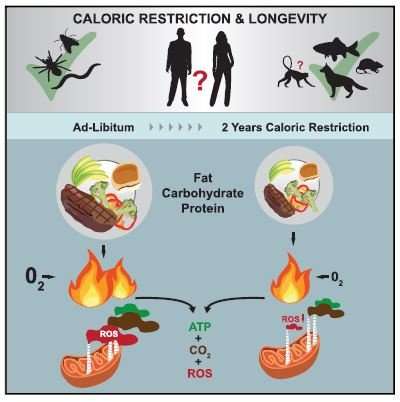Calorie restriction trial in humans suggests benefits for age-related disease

One of the first studies to explore the effects of calorie restriction on humans showed that cutting caloric intake by 15% for 2 years slowed aging and metabolism and protected against age-related disease. The study, which will appear March 22 in the journal Cell Metabolism, found that calorie restriction decreased systemic oxidative stress, which has been tied to age-related neurological conditions such as Alzheimer's and Parkinson's diseases, as well as cancer, diabetes, and others.
"Restricting calories can slow your basal metabolism, and if by-products of metabolism accelerate aging processes, calorie restriction sustained over several years may help to decrease risk for chronic disease and prolong life," says lead author Leanne M. Redman, associate professor of Clinical Sciences at Pennington Biomedical Research in Baton Rouge, LA.
CALERIE (Comprehensive Assessment of the Long-Term Effects of Reducing Intake of Energy) was the first randomized controlled trial to test the metabolic effects of calorie restriction in non-obese humans. The second phase of the study reports results from 53 healthy, non-obese men and women between ages 21 and 50 who cut calories by 15% over 2 years and underwent additional measurements for metabolism and oxidative stress. The calorie reductions were calculated individually through the ratio of isotopes absorbed by the participants' molecules and tissues over 2 weeks, a technique that accurately pinpoints a weight-maintenance calorie level.
Those in the calorie restriction group lost an average of almost 9 kg, although they did not follow a particular diet and weight loss was not the study's goal. No adverse effects, such as anemia, excessive bone loss, or menstrual disorders were noted; in fact, both trials led to improvements in mood and health-related quality of life. "We found that even people who are already healthy and lean may benefit from a calorie restriction regimen," Redman says.
In lab animals, calorie restriction lowers core body temperature and resting metabolic rate. Redman emphasized that CALERIE looked at the effects of calorie restriction on aging, not weight loss, where discussions of "fast" or "slow" metabolism most often arise. "We know from mammalian studies that the smaller the mammal, the faster their metabolism and the shorter their longevity," she says.
Many factors, such as antioxidant mechanisms and dietary and biological factors, influence metabolism, Redman says, but current theories hold that a slower metabolism is most beneficial for healthy aging and that organisms that burn energy most efficiently should experience the greatest longevity.
"The CALERIE trial rejuvenates support for two of the longest-standing theories of human aging: the slow metabolism 'rate of living' theory and the oxidative damage theory," she says. The latter ties overproduction of free radicals to oxidative damage to lipids, proteins, and DNA, leading to chronic diseases such as atherosclerosis, cancer, diabetes, and rheumatoid arthritis.
While the number of participants was relatively small and the duration short in the context of a human lifespan, biomarkers of aging were improved in study participants. Next steps include establishing robust biomarkers of human aging and examining the effects of calorie restriction in conjunction with antioxidant foods or substances like resveratrol, which mimic calorie restriction.
More information: Cell Metabolism, Redman et al. "Metabolic Slowing and Reduced Oxidative Damage with Sustained Caloric Restriction Support the Rate of Living and Oxidative Damage Theories of Aging." www.cell.com/cell-metabolism/f … 1550-4131(18)30130-X , DOI: 10.1016/j.cmet.2018.02.019



















